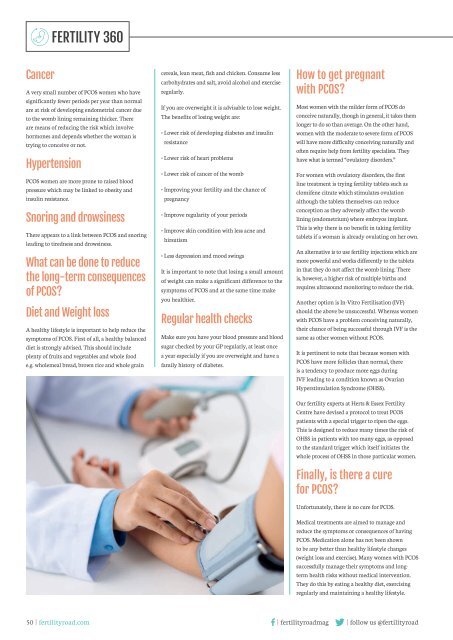Fertility Road Magazine 46 - September/October 2018
The latest issue of Fertility Road Magzine brings you our latest Fertility Journeys update, a closer look at stress and infertility, natural approaches to endometriosis and a how your weight can affect your chances of getting pregnant plus lots, lots more.
The latest issue of Fertility Road Magzine brings you our latest Fertility Journeys update, a closer look at stress and infertility, natural approaches to endometriosis and a how your weight can affect your chances of getting pregnant plus lots, lots more.
Create successful ePaper yourself
Turn your PDF publications into a flip-book with our unique Google optimized e-Paper software.
FERTILITY 360<br />
Cancer<br />
A very small number of PCOS women who have<br />
significantly fewer periods per year than normal<br />
are at risk of developing endometrial cancer due<br />
to the womb lining remaining thicker. There<br />
are means of reducing the risk which involve<br />
hormones and depends whether the woman is<br />
trying to conceive or not.<br />
Hypertension<br />
PCOS women are more prone to raised blood<br />
pressure which may be linked to obesity and<br />
insulin resistance.<br />
Snoring and drowsiness<br />
There appears to a link between PCOS and snoring<br />
leading to tiredness and drowsiness.<br />
What can be done to reduce<br />
the long-term consequences<br />
of PCOS?<br />
Diet and Weight loss<br />
A healthy lifestyle is important to help reduce the<br />
symptoms of PCOS. First of all, a healthy balanced<br />
diet is strongly advised. This should include<br />
plenty of fruits and vegetables and whole food<br />
e.g. wholemeal bread, brown rice and whole grain<br />
cereals, lean meat, fish and chicken. Consume less<br />
carbohydrates and salt, avoid alcohol and exercise<br />
regularly.<br />
If you are overweight it is advisable to lose weight.<br />
The benefits of losing weight are:<br />
• Lower risk of developing diabetes and insulin<br />
resistance<br />
• Lower risk of heart problems<br />
• Lower risk of cancer of the womb<br />
• Improving your fertility and the chance of<br />
pregnancy<br />
• Improve regularity of your periods<br />
• Improve skin condition with less acne and<br />
hirsutism<br />
• Less depression and mood swings<br />
It is important to note that losing a small amount<br />
of weight can make a significant difference to the<br />
symptoms of PCOS and at the same time make<br />
you healthier.<br />
Regular health checks<br />
Make sure you have your blood pressure and blood<br />
sugar checked by your GP regularly, at least once<br />
a year especially if you are overweight and have a<br />
family history of diabetes.<br />
How to get pregnant<br />
with PCOS?<br />
Most women with the milder form of PCOS do<br />
conceive naturally, though in general, it takes them<br />
longer to do so than average. On the other hand,<br />
women with the moderate to severe form of PCOS<br />
will have more difficulty conceiving naturally and<br />
often require help from fertility specialists. They<br />
have what is termed “ovulatory disorders.”<br />
For women with ovulatory disorders, the first<br />
line treatment is trying fertility tablets such as<br />
clomifene citrate which stimulates ovulation<br />
although the tablets themselves can reduce<br />
conception as they adversely affect the womb<br />
lining (endometrium) where embryos implant.<br />
This is why there is no benefit in taking fertility<br />
tablets if a woman is already ovulating on her own.<br />
An alternative is to use fertility injections which are<br />
more powerful and works differently to the tablets<br />
in that they do not affect the womb lining. There<br />
is, however, a higher risk of multiple births and<br />
requires ultrasound monitoring to reduce the risk.<br />
Another option is In-Vitro Fertilisation (IVF)<br />
should the above be unsuccessful. Whereas women<br />
with PCOS have a problem conceiving naturally,<br />
their chance of being successful through IVF is the<br />
same as other women without PCOS.<br />
It is pertinent to note that because women with<br />
PCOS have more follicles than normal, there<br />
is a tendency to produce more eggs during<br />
IVF leading to a condition known as Ovarian<br />
Hyperstimulation Syndrome (OHSS).<br />
Our fertility experts at Herts & Essex <strong>Fertility</strong><br />
Centre have devised a protocol to treat PCOS<br />
patients with a special trigger to ripen the eggs.<br />
This is designed to reduce many times the risk of<br />
OHSS in patients with too many eggs, as opposed<br />
to the standard trigger which itself initiates the<br />
whole process of OHSS in those particular women.<br />
Finally, is there a cure<br />
for PCOS?<br />
Unfortunately, there is no cure for PCOS.<br />
Medical treatments are aimed to manage and<br />
reduce the symptoms or consequences of having<br />
PCOS. Medication alone has not been shown<br />
to be any better than healthy lifestyle changes<br />
(weight loss and exercise). Many women with PCOS<br />
successfully manage their symptoms and longterm<br />
health risks without medical intervention.<br />
They do this by eating a healthy diet, exercising<br />
regularly and maintaining a healthy lifestyle.<br />
50 | fertilityroad.com<br />
| fertilityroadmag | follow us @fertilityroad
















